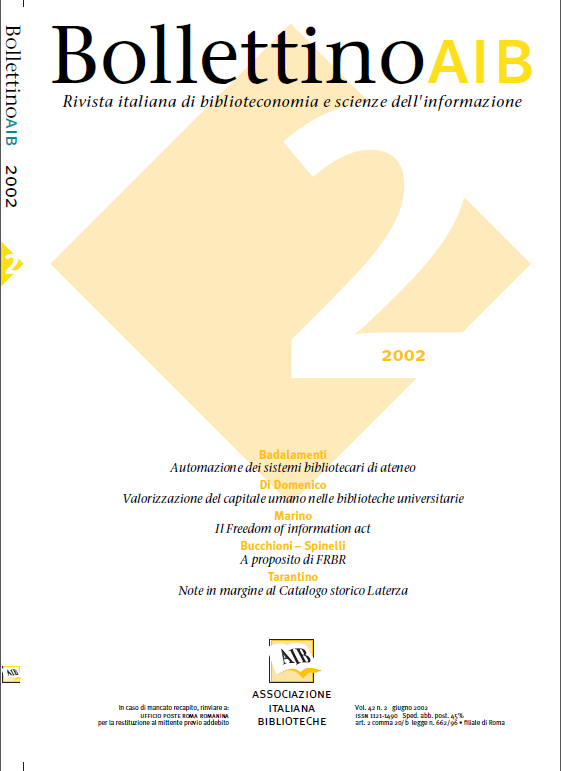A new stage of university libraries' automation: how to face the change
Main Article Content
Abstract
In these years, several universities in Italy find themselves in the condition of rethinking about the choices done for the libraries' automation: it seems by now settled that every five years it must be faced the topic of the change. Starting from the results of a survey on the universities libraries' automation, carried out by the team of the Ministry of University and Technological Research in 1998, we sum things up on the actual situation regarding softwares adopted at that moment.
Half of the 10 products assessed in 1998 (excepted SBN and homemade products) results to be now in phase of discard, others are still in use, but with a limited diffusion. However some products of new generation have appeared on the market and are contributing to keep the market lively and enable the librarians a wide possibility of choice: Aleph500, Amicus, Millennium, Qseries, SBN-Unix, Voyager.
As consequence of the market's evolution and globalization we can't anymore classify softwares according to the place of production, while it is much more significant to focus the attention on the fact that these products have an international dissemination or their use is limited in a national field. As the maintenance and development costs are always much higher, the producers are obliged to find continuously new users and so to enlarge the market. Therefore a product with an international dissemination seems to give more guarantees of longevity.
For the selection of a new automation's software, some important methodological choices in the organization of the workflow are necessary: reflection on the users expectations; creation of internal team; analysis of managerial needs; structuring of analytical evaluation's grids; detailed definition of the expectations regarding the new product. It is really important to issue, on a specific Web site, the results of the work done and of the discussions inside the evaluation's groups, so that they will be useful to other colleagues.
At last some advanced proposals could allow a much more accurate testing work, with a less waste of internal energies and with the development of a deeper know how: final test of the products organized in cooperative groups among different universities; stages in other universities to work next to colleagues with more experience, in a national setting; development and strengthening of users consortium, as an effective tool of negotiations with producers and distributors; development of a major criticality in the evaluation of the conformity of the managerial functions of automation programs to the international standards recommendations; development of the cooperation and the outsourcing management of automation programs, especially for smaller libraries; development of an exchange politics among operators and of training courses; start off of technical comparison occasions between users of different software; constitution of an on-line database where update constantly the information related to the choice of the automation systems, but also the projects in progress and the open problems.
Half of the 10 products assessed in 1998 (excepted SBN and homemade products) results to be now in phase of discard, others are still in use, but with a limited diffusion. However some products of new generation have appeared on the market and are contributing to keep the market lively and enable the librarians a wide possibility of choice: Aleph500, Amicus, Millennium, Qseries, SBN-Unix, Voyager.
As consequence of the market's evolution and globalization we can't anymore classify softwares according to the place of production, while it is much more significant to focus the attention on the fact that these products have an international dissemination or their use is limited in a national field. As the maintenance and development costs are always much higher, the producers are obliged to find continuously new users and so to enlarge the market. Therefore a product with an international dissemination seems to give more guarantees of longevity.
For the selection of a new automation's software, some important methodological choices in the organization of the workflow are necessary: reflection on the users expectations; creation of internal team; analysis of managerial needs; structuring of analytical evaluation's grids; detailed definition of the expectations regarding the new product. It is really important to issue, on a specific Web site, the results of the work done and of the discussions inside the evaluation's groups, so that they will be useful to other colleagues.
At last some advanced proposals could allow a much more accurate testing work, with a less waste of internal energies and with the development of a deeper know how: final test of the products organized in cooperative groups among different universities; stages in other universities to work next to colleagues with more experience, in a national setting; development and strengthening of users consortium, as an effective tool of negotiations with producers and distributors; development of a major criticality in the evaluation of the conformity of the managerial functions of automation programs to the international standards recommendations; development of the cooperation and the outsourcing management of automation programs, especially for smaller libraries; development of an exchange politics among operators and of training courses; start off of technical comparison occasions between users of different software; constitution of an on-line database where update constantly the information related to the choice of the automation systems, but also the projects in progress and the open problems.
Article Details
Section
Articles

This work is licensed under a Creative Commons Attribution-ShareAlike 4.0 International License.
